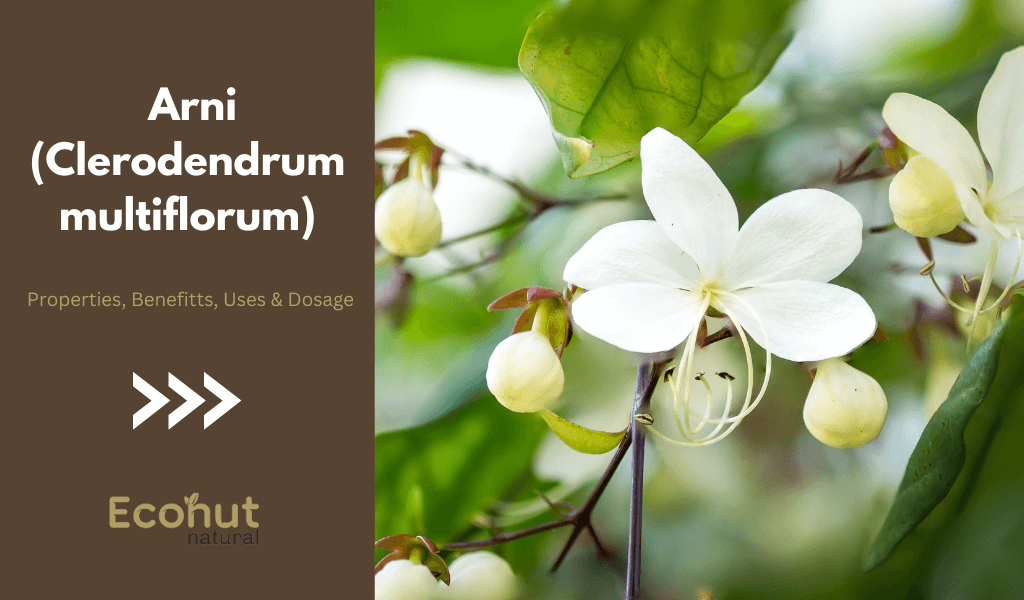Introduction
Arni (Clerodendrum multiflorum) is a species of flowering plant in the Lamiaceae family. It is native to tropical regions of Africa, particularly in countries like Nigeria, Cameroon, and Uganda. Arni is renowned for its ornamental value, featuring clusters of beautiful, fragrant white flowers with purple centers. These flowers attract pollinators like bees and butterflies.
The Latin name of this tree is Clerodendrum multiflorum. This herb has been used in African folk medicine for various purposes. Different parts of the plant, including the leaves, roots, and stem bark, are utilized in herbal remedies.
Discription
Arni (Clerodendrum multiflorum), also known as the glorybower or bagflower, is a flowering plant native to tropical regions of Africa and Asia. Here, We describe some of characteristics regarding Arni (Clerodendrum multiflorum).
Appearance:
Arni is a large shrub or small tree that can grow up to 6 meters (20 feet) in height. It has an upright growth habit with branches that spread widely.
Fruits:
After flowering, Arni produces small, round berries that turn from green to black as they ripen. These berries are not typically consumed by humans but may be eaten by birds and other wildlife.
Leaves:
The leaves of Arni are simple, opposite, and dark green in color. They are typically ovate to elliptical in shape with serrated margins. The leaves are arranged in pairs along the stems.
Flowers:
One of the most striking features of Arni is its flowers, which are produced in large clusters at the ends of branches. The individual flowers are small and tubular, with long, slender corollas that are typically white in color. The flowers have a pleasant fragrance and attract pollinators such as butterflies and bees.
Growing conditions:
Arni thrives in warm, tropical climates with plenty of sunlight and well-drained soil. It is relatively low-maintenance once established and can tolerate a range of soil types.
Cultural significance:
In some cultures, Arni is valued not only for its ornamental beauty but also for its medicinal properties. Various parts of the plant, including the leaves and roots, are used in traditional medicine to treat a range of ailments.
Dosage:
Powder: 1-3 gm
Decoction: 50-100 ml
Leaf juice: 10-20 ml in per day
Part Used:
Root bark, Leaf
Vernacular Names
Hindi Name: Tekar, Arni, Agathu, Ganiyari
Tamil Name: Taludalai, Talanaju, Munnay, Munnai
Kannada name: Arani, Taggiberu, Taggi
Malayalam name: Munja, Munnai
Telugu Name: Nelli, Gabbunulli, Gabbunelli
Marathi name: Eirani, Eran, Takali, Airana, Takalu, Chamari
Gujarati name: Arani, Aranel, Airanamula
Bengali name: Ganibhari, Ganiyari, Ganira
Oriya name: Ganiary
French name: Arbe a la migraine
Scientific Classification
| Kingdom | Plantae |
| Genus | Clerodendrum |
| Family | Verbenaceae |
| Order | Lamiales |
| Division | Angiospermae |
| Class | Dicotyledonae |
| Subclass | Gamopetalae |
| Series | Bicarpellate |
| Species | integrifolia |
Aturvedic Properties
Rasa (Taste): Tikta (Bitter), Katu (Pungent), Kashaya (Astringent), Madhura (Sweet)
Veerya: Ushna (Hot Potency)
Effect on Tridosha: Balances Vata and Kapha dosha
Guna (Qualities): Laghu (Lightness), Rooksha (Dry)
Vipaka: Katu (Undergoes pungent taste conversion after digestion)
Arni (Clerodendrum multiflorum) Benefits
Arni, also known as Clerodendrum multiflorum, is a plant with several traditional uses and potential health benefits. Here, We are discuss some of important benefits regarding Arni (Clerodendrum multiflorum).
Useful For Wound healing:
Arni has been used traditionally to aid in wound healing. It is believed to possess properties that promote tissue repair and regeneration, helping wounds to heal faster.
Anti-inflammatory Elements:
Arni is believed to possess anti-inflammatory properties, which can be helpful in reducing inflammation in the body. This property may be beneficial in managing conditions like arthritis and other inflammatory disorders.
Beneficial In Antioxidant activity:
This herb contain antioxidants properties that help in neutralizing harmful free radicals in the body, thus protecting cells from oxidative damage. This can contribute to overall health and may help prevent various diseases.
Useful In Hair care:
Arni is sometimes used in hair care products due to its purported ability to strengthen hair follicles and promote hair growth. It is believed to nourish the scalp and improve hair texture.
For Better Respiratory health:
In some systems of medicine, This herb is used to treat respiratory ailments such as coughs, colds, and bronchitis. Its expectorant properties may help in expelling mucus from the respiratory tract.
Analgesic effects:
Some medicinal science practices utilize Arni for its potential analgesic effects, which means it may help alleviate pain and discomfort.
Antimicrobial activity:
Some Medical Studies report suggest that Arni contains exhibits antimicrobial elements, which can help in fighting against various pathogens like bacteria, viruses, and fungi. This property may be beneficial in preventing infections.
Also More: Kushmanda, Winter Melon (Benincasa Hispida)
Side Effects of Arni (Clerodendrum multiflorum)
Arni, or Clerodendrum multiflorum, is a plant native to Africa and widely used in traditional medicine. Here, We discuss some of important side effects regarding Arni (Clerodendrum multiflorum).
Occurs Allergic reactions:
Some peoples may be allergic to Arni or plants in the same family (Lamiaceae). Allergic reactions could range from mild symptoms like itching or hives to severe reactions like anaphylaxis.
Produce Skin irritation:
Direct contact with the plant or its sap may cause skin irritation or allergic reactions in some peoples.
Generates Gastrointestinal System Issue:
Consuming parts of the plant or its extracts may lead to stomach upset, nausea, vomiting, or diarrhea in some people.
Medicines interactions:
This herb may interact with certain medications or supplements. If you’re taking any drug, especially for chronic conditions, consult with a healthcare professional before using Arni medicinally.
High Dosage Diverts to Poison:
Some species of this herb contain toxic elements that could be harmful if ingested in large amounts. While Arni is traditionally used in small doses, excessive consumption may lead to toxicity.
Avoid Use During Pregnancy and Breastfeeding:
There isn’t enough reliable information about the safety of Arni during pregnancy or breastfeeding. It’s best to avoid using it during these times to prevent any potential harm to the mother or baby.
Conclusion
Arni (Clerodendrum multiflorum) stands as a botanical marvel, captivating with its ornamental foliage and vibrant clusters of flowers. Its diverse array of traditional medicinal uses, ranging from treating skin disorders to respiratory ailments, underscores its significance in herbal medicine. The plant’s resilience in diverse climates and its adaptability make it a valuable asset for both ornamental gardening and pharmacological exploration.
FAQS
What are the health benefits of Arni?
This herb has been used in various medicinal practices for its anti-inflammatory, antimicrobial, and antioxidant properties. It’s help with conditions like arthritis, skin diseases, and digestive issues.
Is Arni effective for arthritis?
Some medical science report suggest that Arni possesses anti-inflammatory elements that may help alleviate symptoms of arthritis. However, more research is needed to determine its effectiveness and safety for this condition.
Can Arni be used for skin conditions?
This herb antimicrobial and anti-inflammatory properties may help soothe irritated skin and promote healing. So, Arni is commonly used in medicine for treating skin conditions like eczema, psoriasis, and acne.

